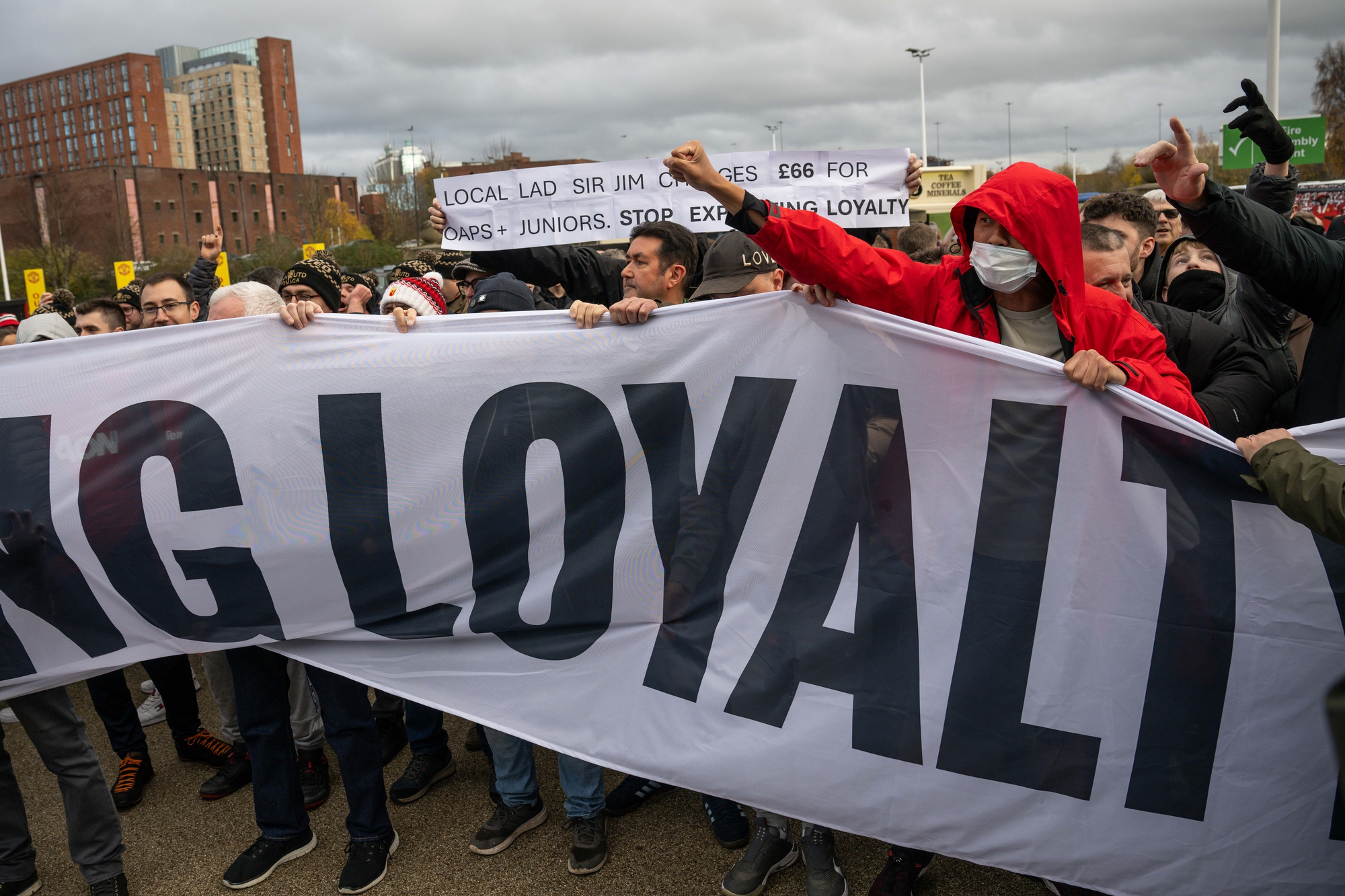In the aftermath of the January transfer window closing, an outpouring of grief from subsections of Manchester United supporters has led to widespread condemnation towards the leadership of Sir Jim Ratcliffe and his Ineos team.
For many, failing to recruit a recognised forward following the departure of Marcus Rashford, Antony, and Jadon Sancho has left more than a couple of questions surrounding the decision-making of the new-look hierarchy.
While it is hardly ideal for a football club longing for an astute goalscorer, there are mitigating factors surrounding this, and the vast majority point towards the Glazer family.
Bizarrely, this has been largely ignored (online) since the arrival of Sir Jim, and the mere prospect of pointing blame in the direction of the idle American owners is open for ridicule.
I am not jumping to the defence of Ratcliffe and his ‘best-in-class’ team or acting as an individual driving PR as an “INEOS Stooge”, as Arun Mathivanan would have you believe on Twitter.
Instead, I aim to provide accurate information to disgruntled supporters who are, for one reason or another, unaware of the actual financial permutations surrounding further expenditure at the club.
Without question, I despise financial attacks on the working class. I will proudly cock my chest out and stand side by side with nine to five regular folk like myself.
That said, I refuse to ignore facts in exchange for popularity. I want nothing more than to wave goodbye to the American owners and embrace a successful Manchester United side.
But I also appreciate the magnitude of the issues created over close to two decades of mismanagement.
The Profit and Sustainability cloud looming over Manchester
Daily publications regarding the Premier League’s Profit and Sustainability Rules (PSR) have become as regular as the rain. However, I see such confusion regarding the topic.
Take yesterday, for example. David Ornstein mentioned PSR on the Athletics transfer stream, highlighting how it is not currently an issue for United. Inevitably, this led to an outcry from online support regarding the lack of transfer activity from the club.
But he was referring to the financial standing within Old Trafford without further spending. Truthfully, if United had made additional January moves, it would have required added outgoings to facilitate the spending.
Since PSR raised its head in 2013 under the previous flag of Financial Fair Play (FFP), clubs were not allowed to lose more than £105 million over a rolling three-year period.
For those unaware, a rolling period includes two or more continuous years. The simplest financial example works over 10 years with eight 3-year considerations (2020-2022, 2021-2023, and so on).
This figure relies on the proviso that £90m comes from secure funding from owners. With factoring in that detail, three-year losses allowed without such guarantees are £15m.
Most recently, Premier League clubs were assessed for this duration ending 30th June 2024. In September of the same year, the Old Trafford giants revealed they had lost £113.2m for the 2023-24 financial year, having previously recorded losses of £28.7m and £115.5m in the 2022-23 and 2021-22 seasons.
These figures present an alarming realisation about the nature of damage caused by idle owners. However, several mitigating factors worked in favour of United on this occasion.
- The 20-time English champions were given a £35m allowance following Ratcliffe’s 25% minority capture of the club regarding share sales.
- A £40m exceptional allowance was granted for losses during the COVID-19 pandemic during the 2021-22 season.
The Reds managed to stay PSR compliant and inadvertently avoided a points deduction during the 2024-25 campaign. Further actions have since occurred, notably the hugely unpopular decision to make 250 staff redundant, and the catastrophic decision to raise ticket prices to £66.
This ticketing announcement followed confirmation of the £10.4m paid to Erik ten Hag and his staff in compensation and the £11m paid to secure the services of Ruben Amorim.
Additionally, the club had previously confirmed it had spent £8.6m in redundancies towards the employees who departed their roles.
Much of this has left a notably sour taste in the mouths of the Old Trafford faithful, particularly with a perceived notion that the British Billionaire is unconcerned with the team and instead focused on developing his Wembley of the North.
At this stage, it is worth noting that some criteria do not factor into expenditure within PSR. Primary examples include:
- Infrastructure projects.
- Costs regarding any associated women’s team.
- Youth development.
There is a flawed perception which reverberates across the channels about Ratcliffe simply clearing the Glazer debt to alleviate the burden of crippling interest payments.
While this would be a magnificent result for Reds worldwide, in what business world does a minority investor shoulder such an ask?
In the simplest of explanations, the club is where it is because of incompetence under the thumb of the Glazer family and a mishmash of their unqualified cronies.
Ridiculous transfer fees and an inability to recoup money through sales and sky-high player salaries have led us to the present day.
It is worth noting that FFP still exists and operates under the UEFA branch for those competing in European competitions. In short, clubs must balance spending against revenue to avoid sanctions such as fines, points deductions and bans from European competition.
While United benefitted from the aforementioned allowances to reduce their expenditure with PSR, the same criteria were not permitted by UEFA, and the club was fined €300,000 for breaching FFP in 2023.
Revelations in response to the 1958
On 23 January 2025, Manchester United wrote to supporters to state that the club was at serious risk of breaching spending rules, and ticket prices could rise as a result.
“As previously communicated, we are [however] currently making a significant loss each year – totalling over £300m in the past 3 years,” the club letter stated.
“This is not sustainable, and if we do not act now, we are in danger of failing to comply with PSR/FFP requirements in future years and significantly impacting our ability to compete on the pitch.
“We will get back to a cash-positive position as soon as possible, and we will have to make some difficult choices to get there. That has included a significant reduction to our workforce as well as cuts across many areas of spend across our club.
“None of this has been easy, but we believe it is essential to restoring financial sustainability to the club, which will underpin us as we work to get back to the top of English and European football.”
The above was in response to a communication from The 1958, which urged the club to consider the long-term implications of ticket price hikes.
United highlighted the danger of breaching spending rules, but what could come as a result?
Last season, Everton were docked 10 points, later reduced to six on appeal in February for breaching PSR for the three-year period to 2021-22. Additionally, Nottingham Forest were charged and docked four points in March.
Despite the desire for names to bolster an attack, 19-year-old Mathys Tel has moved to Tottenham Hotspur on loan for a fee of €10m, with Spurs covering his salary for the duration of the season (an additional €2m).
While it would be nice to see him line out in the North West, that fee would have caused more harm than worth for Manchester United in their current stature. A decision to pass was not taken because of a lack of desire for on-field success.
Sir Jim Ratcliffe does crave majority ownership
Say what you will about the man and his controversial cost-cutting measures, but idle speculation about his desire to purchase the football club is nonsensical.
For clarity, Ratcliffe spoke about buying Manchester United openly during a Financial Times live conference in October 2022. “It is owned by the six children of the father, and they don’t want to sell,” he stated.
Despite the pushback, he contacted Raine Group, expressing an interest in acquiring the club on 15 January 2023, with the first official bid on 17 February.
His offer was for class B shares, exclusively owned by the Glazer family. At the time, they were $22.00 per share, and an agreement would have allowed Ratcliffe to take a controlling interest in the club.
Inevitably, this was rejected within a week, and his representatives advised that the offer did not match the desire for a full sale or minority primary investment – despite previously stating they did not want to sell the club.
The billionaire attempted three additional offers on 23 March, 23 May and another at the end of July. Each attempt was altered to accommodate the previous feedback from the Glazers representatives.
Finally, in July, Sir Jim was told he would need to offer the same figure to class A shareholders as the then-valued $33 per share being offered to the class B shareholders. Additionally, he would need to commit to a “substantial primary investment” for outright acceptance.
At no point has the 72-year-old expressly stated his desire to avoid buying Manchester United, and sources close to the Theatre of Red have confirmed he remains committed to an outright purchase today.
Furthermore, based on the SEC filing, there appears to be a plan towards strategic purchasing over the next three years.
We suspect he will move to acquire the shares of the four Glazer siblings most keen to sell, inadvertently allowing him to obtain a genuine pathway to majority ownership.
Confirming the above does not make me a sympathiser or a stooge; it is stating facts.
This hierarchy has made mistakes, undoubtedly, but they have a plan alongside Amorim for the summer, and as comical as it is to type this, every penny counts.
Let us know your feelings in the comments or across our social channels.
Recent Posts
- Old Trafford braced for Manchester United and Real Sociedad affair
- Counting the cost of a New Trafford for Manchester United
- Manchester United Fans’ Protest | A Cry Against Debt, Ownership, and a Dying Legacy




